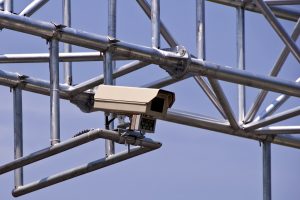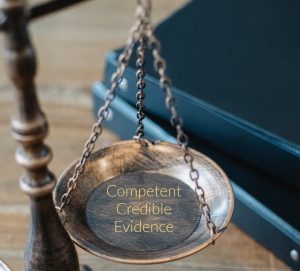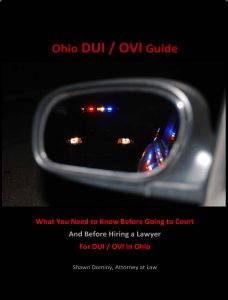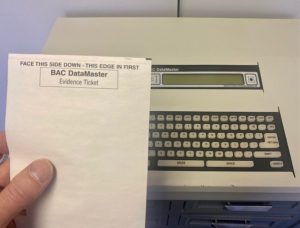 Cases of Vehicular Homicide and Vehicular Assault often involve testimony regarding accident investigation and accident reconstruction. Accident investigation is the collection of evidence at the crash site, and this activity is typically not considered the domain of expert testimony. Accident reconstruction is the use of scientific methods to determine the cause of the accident, so testimony on this subject is ordinarily considered expert testimony. A recent Ohio case illustrates the expert nature of accident reconstruction testimony.
Cases of Vehicular Homicide and Vehicular Assault often involve testimony regarding accident investigation and accident reconstruction. Accident investigation is the collection of evidence at the crash site, and this activity is typically not considered the domain of expert testimony. Accident reconstruction is the use of scientific methods to determine the cause of the accident, so testimony on this subject is ordinarily considered expert testimony. A recent Ohio case illustrates the expert nature of accident reconstruction testimony.
Articles Posted in DUI/OVI laws and cases
Ironic Appeal In Traffic Camera Case
 Some municipalities in Ohio have used unfair procedures for enforcing traffic violations detected by cameras. The Ohio General Assembly addressed that unfairness by creating a new process for traffic camera violations. Not all municipalities are following the new rules. Recently, a municipal court judge found the Village of Brice did not comply with the newly mandated rules. In an ironic twist, Brice complained to the Court of Appeals that the Village was denied due process in the municipal court proceeding.
Some municipalities in Ohio have used unfair procedures for enforcing traffic violations detected by cameras. The Ohio General Assembly addressed that unfairness by creating a new process for traffic camera violations. Not all municipalities are following the new rules. Recently, a municipal court judge found the Village of Brice did not comply with the newly mandated rules. In an ironic twist, Brice complained to the Court of Appeals that the Village was denied due process in the municipal court proceeding.
Ohio Supreme Court Upholds OVI/DUI Stop Based on Shouted Tip
 There are many different ways somebody can find themselves as the subject of an OVI/DUI investigation. The most common is when an officer witnesses a driver commit a traffic offense, initiates a traffic stop, and then conducts an investigation based on their observations of the driver. Other times, an officer will conduct the traffic stop after receiving a tip from someone that a particular driver may be impaired. How precise do these tips need to be to justify a traffic stop? How much corroborating evidence does an officer need to corroborate the tip? The Ohio Supreme Court recently weighed in on these questions in State v. Tidwell.
There are many different ways somebody can find themselves as the subject of an OVI/DUI investigation. The most common is when an officer witnesses a driver commit a traffic offense, initiates a traffic stop, and then conducts an investigation based on their observations of the driver. Other times, an officer will conduct the traffic stop after receiving a tip from someone that a particular driver may be impaired. How precise do these tips need to be to justify a traffic stop? How much corroborating evidence does an officer need to corroborate the tip? The Ohio Supreme Court recently weighed in on these questions in State v. Tidwell.
Ohio DUI /OVI Cases and Competent, Credible Evidence
 When a defendant appeals a DUI conviction (called ‘OVI’ in Ohio), the defendant often claims the judge made an erroneous ruling regarding a motion to suppress. The appellate court then reviews the suppression issue decided by the judge to determine whether the judge’s decision was erroneous. When the issue involves a ‘finding of fact’ by the judge, the appellate court evaluates whether the finding was supported by competent, credible evidence. Two recent Ohio cases illustrate this appellate evaluation with opposite outcomes. Continue Reading
When a defendant appeals a DUI conviction (called ‘OVI’ in Ohio), the defendant often claims the judge made an erroneous ruling regarding a motion to suppress. The appellate court then reviews the suppression issue decided by the judge to determine whether the judge’s decision was erroneous. When the issue involves a ‘finding of fact’ by the judge, the appellate court evaluates whether the finding was supported by competent, credible evidence. Two recent Ohio cases illustrate this appellate evaluation with opposite outcomes. Continue Reading
New Book For Those Charged With DUI / OVI: The “Ohio DUI/OVI Guide”
 Many people charged with DUI (called ‘OVI’ in Ohio), especially those charged with a first offense, feel like they are in the dark. They do not understand the elements and consequences of OVI, and they do not know what to expect in the court process. They also are uncertain about whether to hire a lawyer and how to find a good defense attorney. I recently published a new book, the Ohio DUI/OVI Guide, which answers most of the questions people ask in this situation. My hope is that those who read the guide will no longer be in the dark.
Many people charged with DUI (called ‘OVI’ in Ohio), especially those charged with a first offense, feel like they are in the dark. They do not understand the elements and consequences of OVI, and they do not know what to expect in the court process. They also are uncertain about whether to hire a lawyer and how to find a good defense attorney. I recently published a new book, the Ohio DUI/OVI Guide, which answers most of the questions people ask in this situation. My hope is that those who read the guide will no longer be in the dark.
Discarding Evidence In DUI / OVI Breath-Test Cases
 A police officer discarded evidence that a DUI suspect blew under the ‘legal limit’. According to WCNC, the suspect was involved in a one-car accident and pulled her vehicle into a gas station parking lot. An officer went to the gas station and had the suspect perform field sobriety tests. The officer took the suspect into custody and administered multiple breath tests. The officer obtained two evidence tickets with results from the breath tests. The officer threw-out the evidence ticket with a result ‘under the limit’, kept the evidence ticket with a result ‘over the limit’, and charged the suspect with DUI (called ‘OVI’ in Ohio).
A police officer discarded evidence that a DUI suspect blew under the ‘legal limit’. According to WCNC, the suspect was involved in a one-car accident and pulled her vehicle into a gas station parking lot. An officer went to the gas station and had the suspect perform field sobriety tests. The officer took the suspect into custody and administered multiple breath tests. The officer obtained two evidence tickets with results from the breath tests. The officer threw-out the evidence ticket with a result ‘under the limit’, kept the evidence ticket with a result ‘over the limit’, and charged the suspect with DUI (called ‘OVI’ in Ohio).
Ohio Court Interprets Recent Supreme Court Decision For DUI/OVI Cases
 Over the past couple of years, this blog has followed and discussed the United States Supreme Court’s decision in Mitchell v. Wisconsion. While Supreme Court decisions can seem like seismic shifts in the law when they are issued, the reality is it often takes time for their effects to be felt on a practical level. Such is the case with Mitchell. While it was decided over a year-and-a-half ago, it is just now being discussed by Ohio Appellate Courts.
Over the past couple of years, this blog has followed and discussed the United States Supreme Court’s decision in Mitchell v. Wisconsion. While Supreme Court decisions can seem like seismic shifts in the law when they are issued, the reality is it often takes time for their effects to be felt on a practical level. Such is the case with Mitchell. While it was decided over a year-and-a-half ago, it is just now being discussed by Ohio Appellate Courts.
Appellate Court Rules On Validity Of Traffic Stop Leading To OVI Charges
 DUI cases (called ‘OVI’ in Ohio) are some of the most complicated cases filed in Ohio courts. From field sobriety tests to breath/blood/urine tests, there are many minute and highly technical details that can make or break an OVI defense in court. Often, a seemingly simple but no less important detail can get lost under the mountain of specialized evidence in OVI cases: why did the person get pulled over in the first place? And, more importantly for OVI defense: what degree of evidence does the prosecution need to present to justify that traffic stop?
DUI cases (called ‘OVI’ in Ohio) are some of the most complicated cases filed in Ohio courts. From field sobriety tests to breath/blood/urine tests, there are many minute and highly technical details that can make or break an OVI defense in court. Often, a seemingly simple but no less important detail can get lost under the mountain of specialized evidence in OVI cases: why did the person get pulled over in the first place? And, more importantly for OVI defense: what degree of evidence does the prosecution need to present to justify that traffic stop?
Driving On Lane Line Does Not Justify Stop In Ohio DUI/OVI Cases
 “U Can’t Touch This” – That’s what the trooper believed when he stopped Ryan Turner for touching the ‘fog line’ on Old State Route 74. Based on that belief, the trooper stopped Turner and ultimately charged him with ‘DUI’ (called ‘OVI’ in Ohio). Turner challenged the trooper’s decision, and the case made its way to the Ohio Supreme Court. The Court concluded “you can touch this”, as long as you don’t go over it.
“U Can’t Touch This” – That’s what the trooper believed when he stopped Ryan Turner for touching the ‘fog line’ on Old State Route 74. Based on that belief, the trooper stopped Turner and ultimately charged him with ‘DUI’ (called ‘OVI’ in Ohio). Turner challenged the trooper’s decision, and the case made its way to the Ohio Supreme Court. The Court concluded “you can touch this”, as long as you don’t go over it.
Sealing Records For Ohio DUI / OVI Convictions
 The Michigan legislature recently passed a bill which would permit first-time DUI (called ‘OVI’ in Ohio) offenders to have their records sealed (expunged). Michigan, like Ohio, currently permits record sealing for many criminal offenses but prohibits record sealing for DUI convictions. The Michigan bill passed with an overwhelming majority and is now waiting for the governor’s approval. The potential change in Michigan’s expungement law raises the question of whether first-offense OVI convictions in Ohio should be eligible for record sealing.
The Michigan legislature recently passed a bill which would permit first-time DUI (called ‘OVI’ in Ohio) offenders to have their records sealed (expunged). Michigan, like Ohio, currently permits record sealing for many criminal offenses but prohibits record sealing for DUI convictions. The Michigan bill passed with an overwhelming majority and is now waiting for the governor’s approval. The potential change in Michigan’s expungement law raises the question of whether first-offense OVI convictions in Ohio should be eligible for record sealing.
 Columbus OVI/DUI Attorney Blog
Columbus OVI/DUI Attorney Blog

